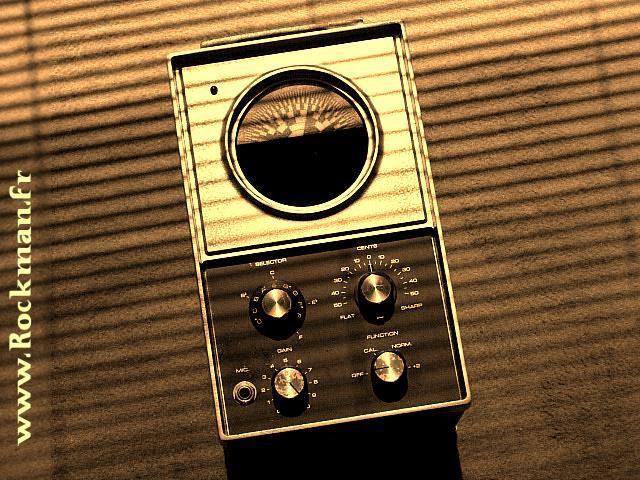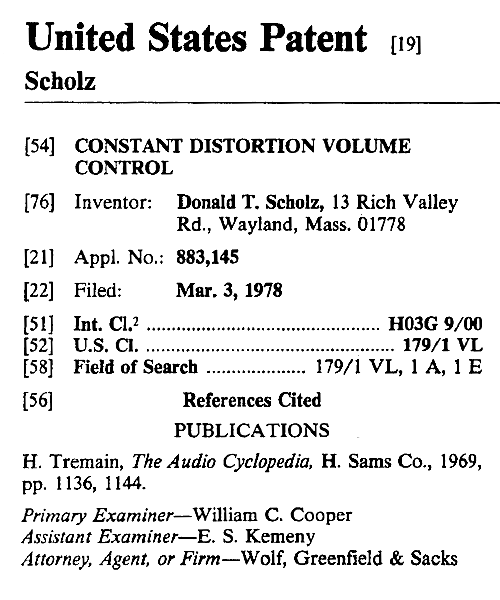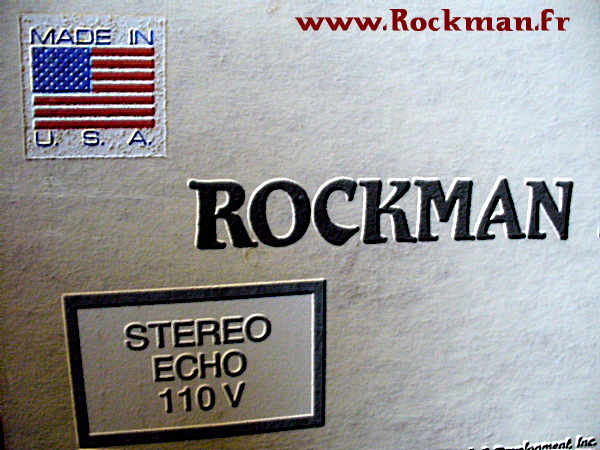|
"Sometimes it seems that every asshole with a soldering gun, a can of spray paint and a Radio Shack within walking distance of his house feels qualified to build a boutique fuzz box and charge an arm and a leg for it..." (Guitar World - Oct. 2001) |

A $30 Tube Screamer clone |
Young people who get interested in building their own effects, usually on the basis of schematics found on the web, have sometimes difficulties to understand why the gear they see in the stores is so expensive compared to what they can do at home. The unspoken question is "how can something be sold $150 when I can build the same for $30?".
Between a concept – pure ideas and projects – and a complete range of commercial products distributed worldwide, one can imagine how long the road is. Creating products is always tough. Creating a company especially for the products you have in mind is a genuine venture.
Doubt, discouragement and difficulties are here everyday, while the satisfaction of people who appreciate what you do is seldom told, and usually never heard. SR&D was a success story, and recognition was never an issue: this is pretty rare.
I do hope that this section of Rockman.fr will help understanding the huge effort behind what we can get by just signing a check, and thus understand that if others hadn’t spent months and years working on their gear, electric guitar would have stayed what it was: amplified guitar…
This will answer the $150 versus $30 issue. |
|
There's another concern that has some explanations too: the "vintage syndrome" and what I call the "guy-next-door syndrome". In plain words:
- Why do we prefer old gear to new technology?
- Why are there so many handbuilt boutique gear manufacturers today?
- Why do people prefer to spend $300 on a handmade copy than $150 on the original?
The guitar gear, especially the guitar effects, was created and designed in the US by a couple of small companies: Ross, MXR, Morley and of course EHX are the most famous names. These creative people have extrapolated the first circuits invented in the sixties (fuzz, wah, phaser) and have built the range of effects that we know today. They were and still are small or very small companies. Not industry giants.
Things have changed in the late seventies, when Japanese companies have flooded the market with low-cost products. These products were not worst than the original US models: they were just as bad, compared to what was made in the eighties and since.
|
 |
But the companies were truly different: anonymous corporations instead of passion-animated workshops. Mass-market replacing craftsmanship. Cheap solid-state combos instead of well-designed tube amps. Of course, this market development had positive consequences, and obliged some manufacturers to highly improve their creations in order to survive.
That's when people started thinking "industrial products are crappy", "handmade gear has a killer sound", and other non-sense: crappy handmade gear sounds crappy if it's made by a non-skilled hobbyist, and industrial gear has a killer sound when people who create it know their job and have the means to build it right.
The impact of technology on sound is not directly involved in this evolution: the gear market has changed from a niche market to a mass market, and that's the main reason why people prefer vintage gear. Not because the old technology sounds better: because in the old days, the manufacturers were all animated by a genuine music passion, while today, these sincere and creative people are drown in the jungle of an industry. Industry can make equivalent products, but industry rarely creates truly innovative products, from a musician's standpoint: industry innovates mainly in the marketing domain.
 |
In a normal situation, every new technology kills the previous one. The manufacturers switched from tubes analog electronics to solid state analog electronics, then from analog electronics to digital signal processing. That's the way things go: who would buy a tubes TV-set today? We all want the last LCD TV, with built-in digital processors.
The patents regulation was built for this classical situation: a patent protects an invention during 20 years, and after 20 years, the invention becomes public because it's obsolete. In the guitar gear domain, the situation is different: people want "vintage" gear, and are reluctant to buying novelties. The guitar players never really accepted solid-state amps, just like they do not accept digital gear today. The older the better, though it's perfectly stupid: you cannot compare new mass-market low-cost gear to old gear produced by mid-size companies based on passion.
So, create an new circuit, and register a patent. You don't sell much, since your gear is not "vintage" yet. After 20 years, people will at last rush on your pedal: it's vintage now. Unfortunately, your patent is over, and any "asshole with a soldering gun" can make clones of your circuit and sell it twice its price!
This wouldn't be a problem if the companies that have created the gear we used today were big companies: there would be leaders and outsiders, full point. The problem is that creators are small companies. Then there are followers who make the money (a few big names), and hundreds of hackers who sell handbuilt clones. That is, from any point of view, unfair. Moreover, it is "dangerous", cause it contributes to the worldwide globalization we are all more or less concerned by.
In 2008, one can identify approximately 1000 "brands" that sell guitar effects. Ross has disappeared, MXR was bought back by Dunlop, Morley is still alive, and EHX almost died in the eighties. The rest is a small number of industrial groups - let's say it: mainly asian companies - but also several hundreds of smart hobbyists who basically sell clones of the initial creations.
|
Who buys this so-called "boutique gear" and why? The musicians, seeing these huge japanese groups, believe that all the gear manufacturers are all big corporations that make a lot of money on them, and prefer to spend $300 on a handmade clone than $150 on a classic product made by one of the original creators. The main reason why people like to buy clones is that when they call the manufacturer, they are of course considered and respected as customers. When they buy industrial gear, they are, much too often, considered as consumers: most of the complaints in users' reviews are about the lack of customer support.
They are actually wrong from A to Z. The professional gear companies are usually small entities of less than 50 people (with exceptions like Fender Musical Instruments in the US, or Roland Corporation and Yamaha in Japan). The handmade effects workshops are only hackers, who are allowed to copy the original products without being accused of counterfeit.
The creative manufacturers were and still are small companies, based in the US for most of them. They are driven by creators - people like Mike Matthews, Andrew Barta or Tom Scholz: people who believe in their products, who design gear for their customers, and do not consider them as basic consumers. People who, like Jimi Dunlop, know why they "don't wanna go to China", cause they have a sense of balance, and don't want a planet where some countries sell and don't buy, while others buy and cannot produce any longer.
The worldwide economy globalization wouldn't be an issue if all the countries had similar roles, and if the exchanges were more or less symmetrical. It is an issue because the countries that have funds to buy are, slowly but surely, becoming dependant on countries hat have funds to produce and do not buy in return. That's where the danger is.
|
I live in France, this old museum country that used to have a creative industry and a healthy economy.
Well, the next generations will be grateful to people like Gustave Eiffel who managed to build his made-in-France tower: at least, they will have something to show in order to have something to eat, and buy clothes made on the other side of the planet...
A few facts now, to help you make your own opinion and choices:
- The guitar sales have been multiplied by 3 in the last ten years. The price of a guitar has been divided by 2.
- There are something like 110 genuine gear manufacturers worldwide, that create the gear we use. There are 890 handmade gear brands, mostly in the US and Germany, who mainly hack the creations of the 110 others.
- 2/3 of the manufacturers are US-based. They represent 1/3 of the sales worldwide
- 5% of the manufacturers are in Japan. They represent 50% of the sales worldwide
- Boss has sold over 10 millions stompboxes in 30 years. SR&D sold something like 70.000 Rockmodules in 7 years.
|
 |
Back to Scholz, Research and Development.
The headcount of SR&D was, in the last years, about 70 people working in Waltham, MA. It was a fairly big company in the small world of gear manufacturers.
The first effort of a company creator is of course money. I will not address this here, since I don’t have any reliable information about what SR&D was from a financial point of view: it is possible to make a coarse estimate of the company’s turnover, based on the quantities of the Rockman items and their price-list, but the hypothesis I made are too vague to get something reliable.
Let’s say the average yearly turnover was in the range of 1 or 2 millions dollars, but it was certainly less in the beginning, and much more during the golden years.
Let's review now what these 70 people have done from 1980 to 1994, in this plant located in Massachusetts: all these back-office activities that no-one has seen, though they make the difference between "creating" and "selling"...
|
